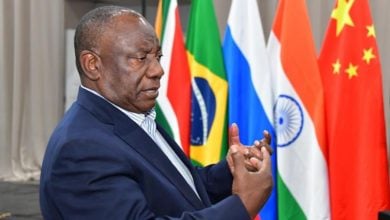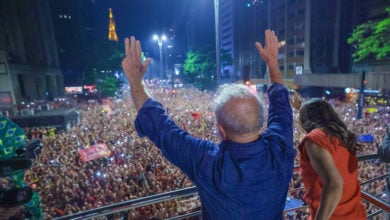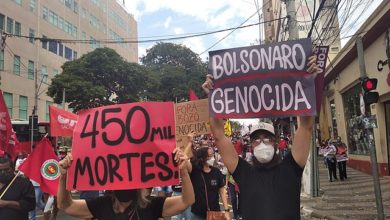In a special episode of Loud and Clear, host Brian Becker spoke with Brazilian journalist and geopolitical analyst Pepe Escobar and Victor Fraga from Democracy for Brazil UK in light of the removal of Brazilian president Dilma Rousseff from office enacted by an Upper House vote.
They discussed what the impeachment means for Brazil, how the new Brazilian government will operate and interact in the context of geopolitics and the country’s future.
President Dilma, as the first female head of state of Brazil has endured a lifetime of trials and tribulations. She is a former Marxist guerilla fighter who endured torture during the time she was imprisoned for her political activity, is a lymphoma survivor and helped found a political party.
“What happened to Dilma isn’t just an insult to democracy, isn’t just a coup d’etat, it’s a permanent wound in our pride in our confidence in our justice. It shows that Brazil will…always struggle as a young democracy, will never mature. We have a history of coup d’etats, several coup d’etats,” said Victor Frago.
Frago also noted that many presidents in the last 80 years in Brazil did not finish their terms for diverse reasons including coup d’etats.
“This is a victory of the elites.” he said, also mentioning that this was a victory against the people- including the poor and working class.
Frago praised Dilma, who endured sitting long hours in the courtroom as the parliament decided her fate.
Pepe Escobar said that the coup in Brazil was a “hhronicle of impeachment foretold.” The agenda of the Brazilian elites was twofold: to impeach Dilma and to criminalize Lula. This is all part of a larger strategy to get the Workers Party out of power. Escobar believes that the people in the Brazilian government are elected with “dodgy money and dodgy deals” behind them and that Brazil’s elites are on the same or even a worse level than other countries all over the world. This comes from his experience living in the UK, France, U.S. and Asia and also growing up with Brazilian elites whom he describes as “arrogant, ignorant and disrespectful.”
Escobar said he was only 10 years old during the military coup of 1964 and sees parallels between that and today’s coup. However he finds that there doesn’t need to be direct U.S. intervention in order to implement a coup and instead sees it as a “complex 21st century, digital hitch coup controlled by big media made up of five corporate families in Brazil.
“I grew up with [the families], I wrote for their newspapers when I was still living in Brazil a long time ago so when you know these people and you know their mentality,[you know that] they were ready for everything. And having lost four elections in a row-presidential elections in a row-[against] the Workers Party was too much. The whole destabilization actually happened even before the end of the last presidential election in late 2014. They knew they were going to lose and they started to undermine the whole political system even before that. So the whole year of 2015 that’s exactly what happened and 2016 the same thing.”
As far as what’s next for Brazil, Fraga, like Escobar, sees this as a repeat of history. He predicted people will take to the streets in the same way people demonstrated in the 1960s.
The economic and social circumstances that provided a context for the coup leaders, Escobar said, was the 2007/2008 Wall St. crisis that did not hit Brazil until around 2014, right before the election in November 2014 of Dilma Rousseff. Escobar said that another problem in the Brazilian economy that created a context for a coup was that Brazil did not have a plan B. Plan A was the exportation of commodities and Plan B should have been investing in education and forming stronger cadre. He also finds that Brazil has not diversified its economy and needs a five year plan like in China.
Fraga mentioned that workers’ rights in Brazil were more advanced than in other countries since some they have a living wage and benefits. He fears Temer will destroy that, as the Temer government has already made plans to attack the health care system, make the working week 80 hours a week and raise the retirement age to 70 years.
He also finds that Brazil’s alliance with large emerging countries like Russia, India or China, South Africa in BRICS will affect
international forces, especially since there were trade relations between Brazil and China under Lula.
Escobar has concerns about Brazilian trade relations as well, especially since all of the BRICS alliances were pushed through Lula’s two terms and Dilma’s first term. He fears that the Temer government will destroy the trade alliances in BRICS, inside South America and integration in Eurasia. He finds that the coup is also destroying Brazilian national companies, which is a direct attack on the Brazilian indigenous industry. The coup government essentially wants to privatize everything.
There have been many accounts of regional reactions to the coup. Venezuela and Ecuador both recalled their ambassadors and Bolivia promised to do the same even before the vote.
Venezuelan President Maduro said after the impeachment vote: “Never again will we lend legitimacy to these practices which remind of us the darkest hours of our America. All of our solidarity goes out to our comrade Dilma with Lula and all of the Brazilian people.”
Fraga said he knows that neoliberal policies against Brazil were enacted under the Obama presidency so he fears the aggressive policy that could come with a Trump presidency especially after Brexit and the Brazilian coup. “The American dream is the Latin American nightmare,” Fraga said.
In terms of what’s next for Brazil in the coming year, Escobar saif the coup: “[Is] a big blow against Brazil, against the Brazilian democracy, against South American integration, against the global south as a whole because everyone across the global south is paying attention to what is going on politically in Brazil. It’s a blow against BRICS of course, it’s a blow against a multipolar integration and the drive towards a multipolar world. But maybe it’s not going to last very long, because the internal contradictions of this bunch of [elites] are huge….The country will continue to be paralyzed. They don’t have an economic recovery plan for Brazil in fact. They already alienated most of the population. They have no legitimacy.”
“The only solution,” Escobar says “…is to start anew.” While Escobar believes that for the Brazilian people to start anew and uproot the very system is unlikely he also has hope that the coup government will not last very long.





